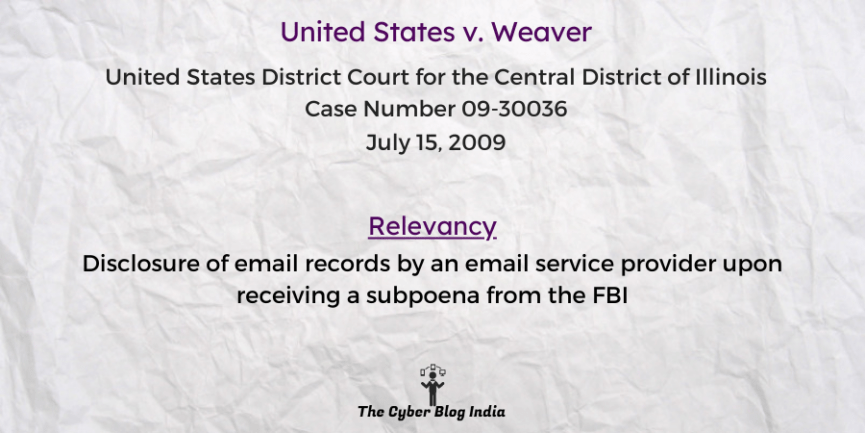United States v. Weaver

United States v. Weaver
636 F.Supp.2d 769
In the United States District Court for the Central District of Illinois
Case Number 09-30036
Before District Judge J.E. Scott
Decided on July 15, 2009
Relevancy of the Case: Disclosure of email records by an email service provider upon receiving a subpoena from the FBI
Statutes and Provisions Involved
- The Stored Communications Act, 18 U.S.C. § 2701 et seq. (“SCA”)
- The Omnibus Crime Control and Safe Streets Act, 18 U.S.C. §§ 2510-2520 (“OCCSSA”)
Relevant Facts of the Case
- The Government filed a motion to enforce a subpoena for document production in the case against the defendant, who faces a child pornography charge.
- The Government aimed to uncover email contents from Weaver’s Microsoft/MSN Hotmail account. It filed a subpoena on May 15, 2009, and faxed to Microsoft on May 19, 2009.
- Although Microsoft provided some information, it refused to disclose the content of emails accessed, viewed, or downloaded within the last 181 days. Microsoft objected, citing a Ninth Circuit Court of Appeals precedent requiring a warrant for such material.
- The critical question concerned whether a court could compel Microsoft, an Internet Service Provider (ISP), to comply with a trial subpoena and disclose a subscriber’s opened emails within 181 days. This was based on the SCA and OCCSSA statutes.
Prominent Arguments by the Counsels
- The plaintiff’s counsel argued that a trial subpoena is sufficient for obtaining the requested electronic communications based on these statutes.
- The defendant’s counsel argued that web-based email systems like Hotmail do not automatically download emails to users’ computers. This distinction makes the Ninth Circuit case Theofel v. Farey-Jones applicable.
Opinion of the Bench
- SCA differentiates between storage and electronic storage. Electronic storage also includes temporary storage incidental to electronic transmission and storage for backup protection.
- The Ninth Circuit’s interpretation is inapplicable mainly due to distinctions between web-based and other email systems.
Final Decision
- The court allowed the plaintiff’s motion to compel compliance with the subpoena to produce email records.
Aditi Mangesh Sawant, an undergraduate student at NMIMS Kirit P Mehta School of Law, Mumbai, prepared this case summary during her internship with The Cyber Blog India in January/February 2024.
